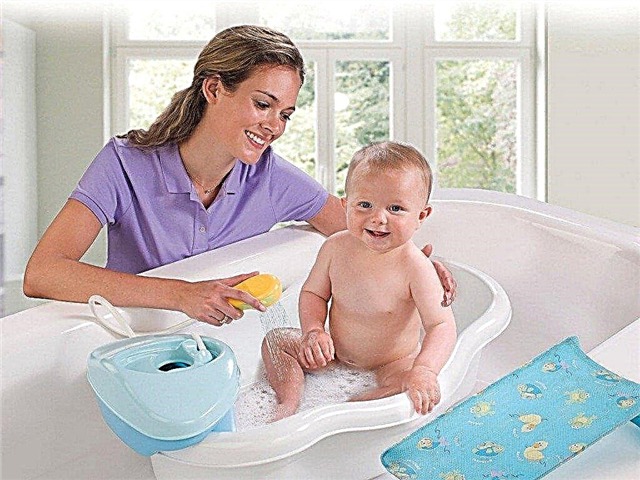
A child who always pleases parents with a sound childhood sleep does not occur as often as we would like. Usually even a calm and balanced baby turns into a little tyrant or crybaby when it's time to go to bed. If mom and dad teach the baby to sleep according to the rules, and do not let this delicate process take its course, then the child will not have any problems with sleep. Accordingly, there will be no problems with lack of sleep and fatigue from his parents and other family members.

Evgeny Komarovsky, an authoritative pediatrician and author of numerous articles and books for parents on children's health, knows how to properly teach a child to go to bed. And he always willingly shares this knowledge with parents who cannot in any way establish a rest regime for their baby.
Baby sleep
Parents should be puzzled about the organization of children's sleep immediately after returning from the hospital. And although a newborn baby sleeps up to 20 hours a day, this is the most appropriate time to establish and first "run in" the sleep and wakefulness regime. If this is done, then rarely at an older age, the baby will have problems falling asleep.


But if the baby was not helped from the very beginning to live according to a certain regime, then the situation may worsen later.
The rules of children's sleep will be told by Dr. Komarovsky in the next video.
Nighttime sleep and daytime sleep are very interrelated. If a child does not sleep well during the day, then, most likely, at night he will have difficulties with a quiet rest, which means that the whole family will not get enough sleep.
Of course, all children are different, as are the families in which they grow up, but doctors have tried to calculate the daily need for sleep for children of different ages. In their opinion, the child will be able to develop normally only when the duration of his sleep is at least approximately close to these, rather average, standards:
- Newborns and children up to a month 9 hours of daytime sleep and 11-12 hours of nighttime sleep (with breaks for snacks) are allotted.
- Up to 2 months the child usually has 4 daytime dreaming episodes and 10 hours of night rest.
- By six months the baby can sleep 2-3 times during the day, and at night he sleeps for at least 9-10 hours. It is no longer necessary to feed him at night.
- The baby goes into two daytime sleep in 7-9 months, the duration of the night's rest remains the same. 10 hours at night and 1-2 daytime sleep for 2 hours are needed for a baby at the age of one year and a little older.


Once again, I note that these norms are quite general, and babies are not at all obliged to comply with these figures and recommended values with pharmaceutical accuracy.

Children sleep differently than adults. They have, according to research by scientists from the UK, a completely different structure of sleep, a different pace of alternation of slow and fast phases.
Children under 6-7 years of age do not see dreams as often as adults think, but more often they suffer from parasomnias (these are the very sleep pathologies that so much complicate the process of normal rest for the whole family). Most often, parosomias are expressed by nightmares, sleep-talk, involuntary movements of the limbs during sleep, sleepwalking. All this is characteristic of perfectly healthy children, there is no talk of diseases of the nervous system.
But any parasomnia that the baby has encountered the day before can increase the fear of falling asleep, and it will not be so easy to put the baby to bed.

Evgeny Komarovsky's rules
The renowned pediatrician notes that the importance of sleep should in no way be underestimated. The child needs it no less than good nutrition, vitamins, fresh air and parental love and attention.

Evgeny Olegovich names ten main components of normal sleep:
- Everyone's sleep is important! This means that the child should not sleep due to the insomnia of the mother, who rocked him all night, or the father, who has to go to work in the morning. It is necessary to strive to ensure that all family members sleep at the same time and get enough sleep.
- You need to sleep according to the schedule! The child should sleep when it is most convenient for mom and dad. Parents determine the time of going to bed, based on many factors - work schedule, family rules. But it is important, having chosen it once, to adhere to this particular regime constantly.
- Sleep place. The now practiced joint sleep of parents with a child has little in common, according to Komarovsky, with a healthy child's sleep, in any case, joint sleep does not in any way affect the strength of sleep of the smallest family member. In this matter, it is also better to decide for reasons of convenience for parents - if you want to sleep with your child, please. But Evgeny Olegovich still recommends giving the baby his own crib. If living space allows, it should be in the children's room, if not, in the parents' bedroom.
- Wake up without regrets! If the child sleeps well during the day, and then cannot lie down in the evening, then Komarovsky advises not to be afraid to wake up the baby if he has exhausted the entire daily limit of dreams. This will make it easier to put the baby to bed when it’s time to go to bed in the evening.
- Nutrition. After eating, some children want to play and actively enjoy satiety, while others (and most of them) begin to fall asleep after eating. Komarovsky recommends optimizing the baby's feeding regimen so that before bedtime (evening or afternoon) feeding is more satisfying and dense. This will help the baby fall asleep more easily just when the quiet hour or night sleep is set. And if the child is drawn to play after eating, then it is better to feed him in advance, an hour and a half before the estimated time "H".
- Microclimate. It will be much easier to put the baby to bed if the parents remember that it is difficult to fall asleep in a hot and stuffy room, and it is disgusting to sleep. The doctor calls the optimal parameters of the microclimate as follows: the air temperature is not less than 18 and not more than 20 degrees, and the humidity is 50-70%. Remember to ventilate your bedroom or nursery before every bedtime.
- Bathing. It is quite possible to put the baby in literally 5 minutes, says Komarovsky, if you bathe him in cool water before going to bed, and then put him to bed and cover with a warm blanket. The baby will warm up and begin to fall asleep without motion sickness, which grandparents insist on.
- The bed must be correct! No feather beds and soft blankets, Evgeny Olegovich warns. Only an even and firm mattress, preferably a special children's orthopedic mattress, so that it does not "fall through" and does not bend. A baby under two years old does not need a pillow at all. After this age, you can sleep on a pillow, but it should not be too big or too soft. And no feathers! They can cause severe allergies.
- Delicate issues shouldn't bother! Komarovsky advises parents to be very careful when choosing a diaper for their baby. The better it is, the better the child will sleep. And if the child already goes to the potty, then before going to bed, you should definitely take him to the toilet. Gradually, this will enter into a ritual, which in itself will remind the child of an imminent retirement to bed and mentally prepare him for this.


Motion sickness
There is no benefit in motion sickness for the child's health, but there is no harm either, according to Dr. Komarovsky. If the child refuses to fall asleep without it, then the parents need to know that the child wants and requires a heart-rending scream not of motion sickness itself. He has a need (conditioned by nature) for a sense of security. Naturally, the baby feels protected in his arms.
This instinctive need passes by itself with age, the child "outgrows" it as he grows up. Thus, by rocking the baby, parents only prolong the "life" of the instinct, which is still destined to recede into the past.
If you want to download - please, says Evgeny Olegovich. But remember that this is harmful to the health of the parents, who may be spending this time on something more beneficial than motion sickness.
It is not so difficult to wean from motion sickness before bedtime, Komarovsky said. It is enough to eliminate the cause of anxiety, because it is not the absence of motion sickness that prevents the little one from falling asleep, but, as a rule, more real problems - he is wet, hungry, he has something hurting.
If a child cries until he is picked up and starts crying again as soon as he is put back in the crib, then we are talking about a bad habit that was formed from the wrong attitude of mom and dad to the needs of the baby.

In this situation, families face a difficult choice - to let the child scream and then enjoy the silence, since he will fall asleep anyway, or still take it and shake it. If it's easier to shake and do it every day, or even several times a day, then you need to choose the second one.
Yevgeny Komarovsky emphasizes that parents who decide to endure the scream and remove the issue of motion sickness once and for all are by no means heartless or bad. In addition, the goal is quite clearly visible beyond the horizon - children's cries of protest generally last only a few evenings, and then the sleep of the whole family will become calm, strong and healthy.

More on motion sickness is in the next video.
Doctor Komarovsky's advice
The more active the child spends time between sleep periods, the easier it will be for him to fall asleep. Being active in this situation does not mean watching cartoons. It is good for a baby to do gymnastics, massage, an older child - active games in the fresh air are suitable.
Restless sleep is often caused by an abundance of impressions. Children under the age of 3 are very sensitive to everything new. This is not worth watching a new cartoon or visiting, as well as arranging noisy parties just before falling asleep. It is advisable to complete all entertainment activities at least two hours before evening procedures before bedtime - bathing, toilet and going to bed.
Very often, says Komarovsky, parents of plump babies complain about problems with falling asleep and about disturbances in sleep itself, who from birth have been taught to eat a lot and densely. Digestion, which is occupied by the body, if you eat right before bedtime, does not make you sleep sound. Therefore, it is better not to overfeed the child.
If the child is very anxious and impressionable, parents can get him a "friend" - a plush toy with which he will invariably go to bed every evening. The main thing is not to forget to take this “friend” with you if you have a trip, a trip, or an overnight stay somewhere at a party or with relatives. Because a three-year-old child without the usual bear will flatly refuse to fall asleep and will be absolutely right in his own way.
For information on what to do if a child has a bad dream, see the video of Dr. Komarovsky.



